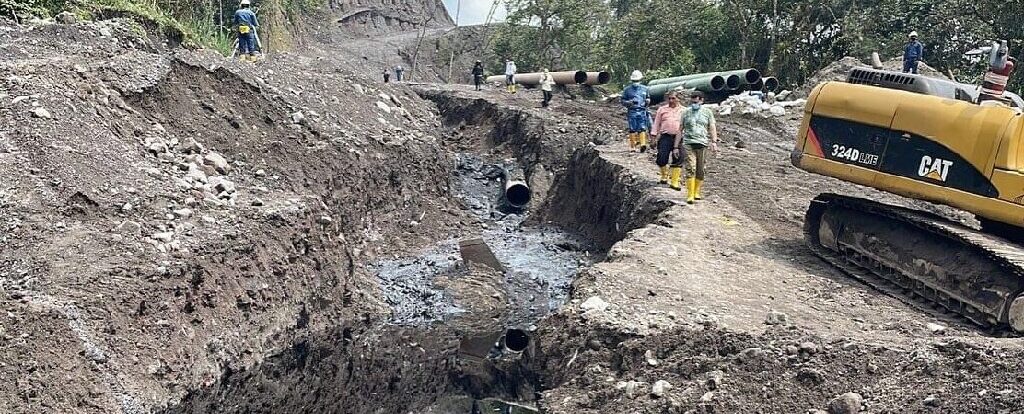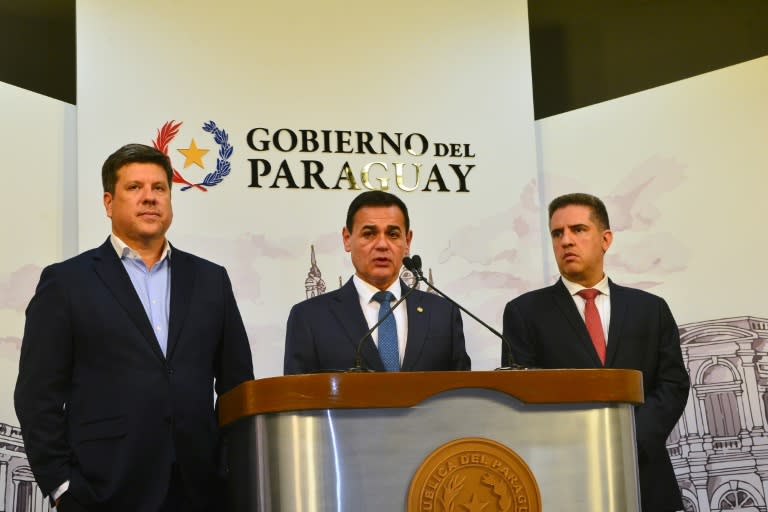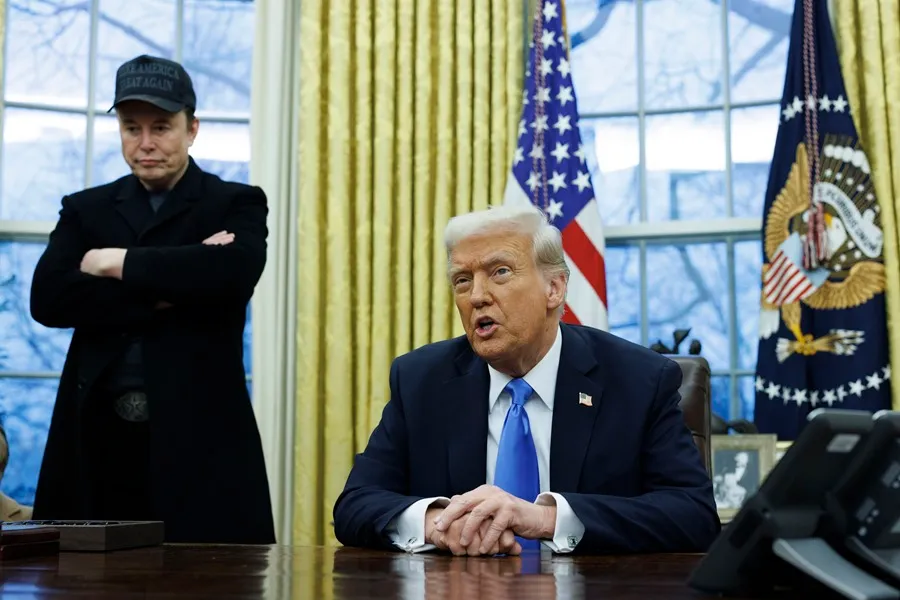International
Oil spill pollutes nature reserve in Ecuadoran Amazon

AFP
An oil spill in eastern Ecuador has reached a nature reserve and polluted a river that supplies water to indigenous communities, the country’s environmental ministry said Monday.
Nearly two hectares (five acres) of a protected area of the Cayambe-Coca national park have been contaminated, as well as the Coca river — one of the biggest in the Ecuadoran Amazon, the ministry said in a statement.
The park of some 400,000 hectares is home to a wide variety of protected animals and holds important water reserves.
Heavy rains caused a mudslide in the eastern Napo province on Friday, during which a rock struck and ruptured a pipeline owned by private company OCP Ecuador.
The company said Sunday it had begun repairing the pipeline and that “crude oil has been collected in retention pools to be taken to the Lago Agrio station in tanker trucks.”
OCP’s executive president Jorge Vugdelija blamed the incident on “force majeure.”
OCP’s pipelines can transport up to 450,000 barrels a day from the Amazon to ports on the Pacific coast, although the company only extracted 160,000 barrels between January and November 2021.
In May 2020 in the same area, a mudslide damaged pipelines, resulting in 15,000 barrels of oil polluting three Amazon basin rivers, affecting several riverside communities.
International
Paraguay summons Brazilian ambassador over Itaipú espionage scandal

Paraguay summoned the Brazilian ambassador in Asunción on Tuesday to demand “explanations” and called its own representative in Brasília for consultations following Brazil’s acknowledgment of an espionage operation. The Brazilian government, led by President Luiz Inácio Lula da Silva, attributed the operation to the previous administration.
The surveillance effort aimed to uncover Paraguay’s position in now-suspended negotiations with Brazil regarding the pricing of electricity from the binational Itaipú hydroelectric plant, according to reports in the Brazilian press.
The Brazilian government “categorically denied any involvement in the intelligence operation,” stating in a Foreign Ministry communiqué on Monday that the espionage was carried out under former President Jair Bolsonaro’s administration (2019-2023).
“The operation was authorized by the previous government in June 2022 and was annulled by the interim director of the (state intelligence agency) ABIN on March 27, 2023, as soon as the current administration became aware of it,” Brazil’s government asserted.
Paraguay’s Foreign Minister Rubén Ramírez announced that Brazilian Ambassador José Antonio Marcondes de Carvalho was summoned “to provide detailed explanations” regarding the operation. Additionally, Paraguay recalled its diplomatic representative in Brasília “to report on aspects related to the intelligence activity conducted by Brazil regarding Paraguay’s government affairs.”
International
Elon Musk to step down as government advisor, per Trump insiders

President Donald Trump has informed his inner circle that Elon Musk will be stepping down from his role as a government advisor, according to a report by Politico today.
Citing three individuals close to Trump, Politico states that the president is pleased with Musk’s leadership at the Department of Government Efficiency (DOGE), where he has implemented significant budget cuts. However, both have agreed that it is time for Musk to return to his businesses and support Trump from a different position outside the government.
A senior administration official told Politico that Musk will likely maintain an informal advisory role and continue to be an occasional visitor to the White House. Another source warned that anyone thinking Musk will completely disappear from Trump’s circle is “deluding themselves.”
According to the sources, this transition is expected to coincide with the end of Musk’s tenure as a “special government employee,” a temporary status that exempts him from certain ethics and conflict-of-interest regulations. This 130-day period is set to expire in late May or early June.
International
Milei vows to make Argentina so strong that Falkland Islanders “choose” to join

Argentine President Javier Milei reaffirmed his country’s claim over the Falkland Islands (known as the Islas Malvinas in Argentina) and praised the role of the nation’s armed forces during a ceremony marking the “Veterans and Fallen Soldiers of the Malvinas War Day,” commemorating 43 years since the 1982 conflict with the United Kingdom.
Argentina continues to assert sovereignty over the islands, arguing that Britain unlawfully seized them in 1833.
“If sovereignty over the Malvinas is the issue, we have always made it clear that the most important vote is the one cast with one’s feet. We hope that one day, the Malvinas residents will choose to vote with their feet and join us,” Milei stated.
“That is why we aim to become a global power—so much so that they would prefer to be Argentine, making deterrence or persuasion unnecessary. This is why we have embarked on a path of liberation, working to make Argentina the freest country in the world and once again the nation with the highest GDP per capita on the planet,” he added.
-

 International5 days ago
International5 days agoSon of journalist José Rubén Zamora condemns father’s return to prison as “illegal”
-

 Central America3 days ago
Central America3 days agoU.S. Homeland Security Secretary urges Mexico to strengthen Guatemala border
-

 International5 days ago
International5 days agoMiyazaki’s style goes viral with AI but at what cost?
-

 Central America4 days ago
Central America4 days agoPanama police clarifies that Interpol alert for Martinelli is still pending
-

 International3 days ago
International3 days agoTrump urges Putin to reach peace deal
-

 International23 hours ago
International23 hours agoParaguay summons Brazilian ambassador over Itaipú espionage scandal
-

 Central America3 days ago
Central America3 days agoPanama grants Martinelli 72-hour extension to travel to Nicaragua
-

 International4 days ago
International4 days agoDeportation flight lands in Venezuela; government denies criminal gang links
-

 Sports23 hours ago
Sports23 hours agoFilipe Luis debuts as coach in Copa Libertadores with Flamengo
-

 Central America21 hours ago
Central America21 hours agoGuatemalan police officer killed in mob riots over baby kidnapping
-

 International23 hours ago
International23 hours agoElon Musk to step down as government advisor, per Trump insiders
-

 International23 hours ago
International23 hours agoICE agent’s arrest of suspect sparks controversy in Boston
-

 International23 hours ago
International23 hours agoMilei vows to make Argentina so strong that Falkland Islanders “choose” to join
-

 Sports23 hours ago
Sports23 hours agoVenezuela investigates 18 baseball players seeking asylum in Spain
-

 International23 hours ago
International23 hours agoÓscar Arias: Trump’s trade policies are a step backward















